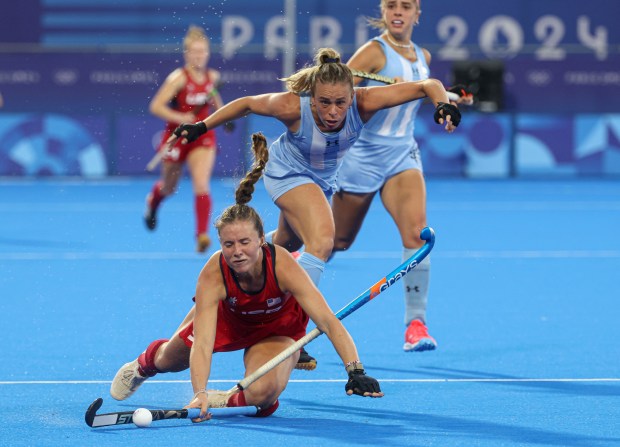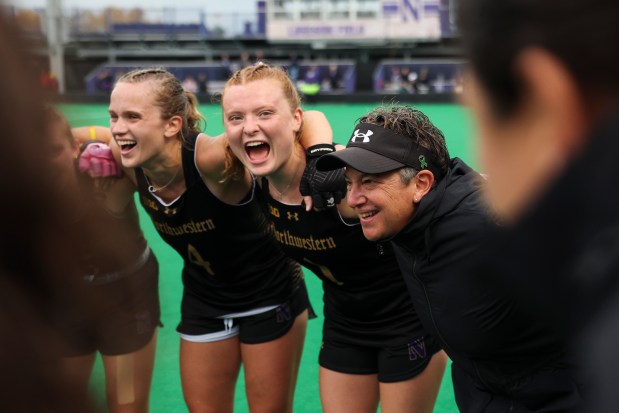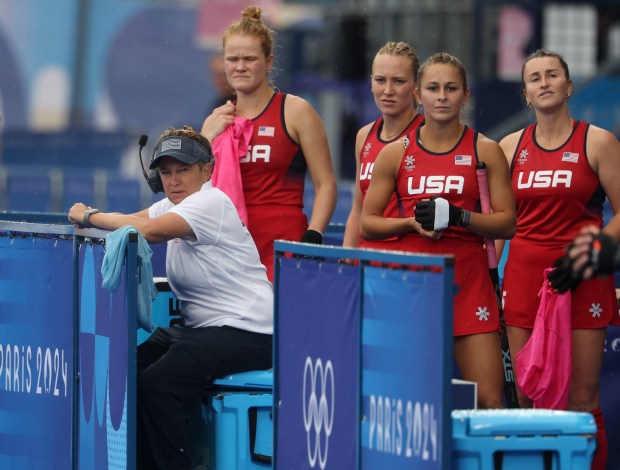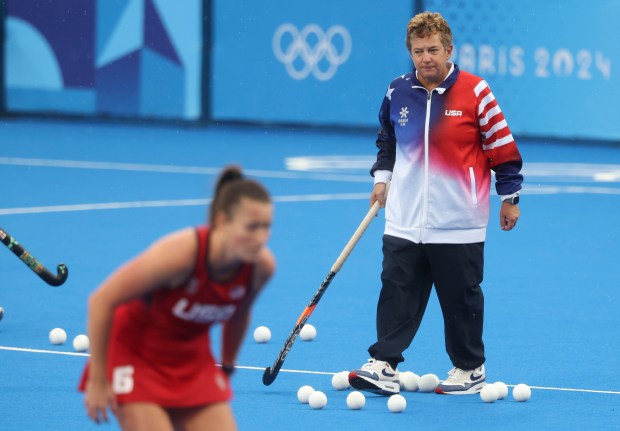PARIS — When the United States women’s field hockey team took on Argentina earlier this week, the only American with Olympic experience on the bench never entered the match.
Instead of taking her trademark penalty corners, Tracey Fuchs sat on the sidelines with the other assistant coaches and offered words of encouragement to the young squad, trying to keep the magnitude of the moment from overwhelming them. It’s not an easy job — the U.S. squad is winless in four pool play matches — but Fuchs believes in this team’s potential.
And the Evanston resident hasn’t forgotten what it’s like to be in their shoes.
“There was no greater joy for me than to play for my country,” Fuchs said before the Games started. “There’s no better jersey to wear than your country’s jersey, so I would have worn it forever if I could have.”
Fuchs wore the jersey longer than anyone else, playing with the U.S. national team for two decades and appearing in a record 260 international matches. Considered one the greatest players in the country’s history, she has served as Northwestern University’s head coach since 2009 and is spending her offseason as an assistant with an inexperienced American squad.
“She’s just an amazing role model for all of us,” said U.S. defender Maddie Zimmer, who also plays for Fuchs at Northwestern. “I don’t think I’ve ever met someone who loves America as much as she does or loves representing her country as much as she does. Her energy is infectious.”
That’s why Fuchs’ role with the U.S. team is particularly critical in Paris, where the assistant coaches are down on the field with the players during the match and head coach David Passmore watches from a box so he can have a bird’s-eye view of the pitch. She has more direct contact with players during the games, and more chances to ignite something within them.
“We’re super lucky to have a coach like her, who has played in these types of situations,” Zimmer said. “Some of us weren’t even alive when she was playing in her prime, but we all know what she’s done as a player and a coach. She’s a name that, in our sport, you just grow up knowing.”

Fuchs, for her part, grew up playing street hockey in her hometown in Centereach, New York. If she had been born a generation or two later, she says she probably would have played competitive ice hockey. As it stands now, she has played in a North Shore women’s league for years, using it as an outlet for her competitive nature.
“I always say it has become the Housewives of Wilmette because I go for the social aspect now, to hear stories about their kids and everything that is happening,” she said. “I absolutely can’t go like I used to, but it’s a lot of fun.”
But on Long Island in the 1970s, women’s ice hockey wasn’t as prevalent. The majority of girls who wanted to hit something into a net with a stick played field hockey.
Fuchs played on her high school team and became captain in her senior year, a position her three sisters also held on the team at different times. Fuchs scored 171 goals during her high school career, one of five U.S. records that she still holds, according to the National Federation of State High School Associations.
She was a three-time All-American at the University of Connecticut, where she won a national championship as a player and graduated with seven scoring records to her name. She joined the U.S. team after college and competed at the 1988 Summer Games in Seoul.
The team finished eighth there and Fuchs — one of the last players named to the roster — received extensive playing time. The experience gave her a taste of competing on a global stage and she wanted more.
“It really gave me the motivation and the push to become one of the world’s better players,” she said.
And she did.

Fuchs spent 17 years on the team, serving as the team captain for 14 seasons. She notched 69 international goals during her career and was named to the world All-Star team in 1994.
She was the master of the penalty corner, a set piece that she practiced over and over until it became second nature. Whenever she scored off a corner in competition, she would take her stick and place it to her hip, as if she were a cowboy sticking her six-shooter into an imaginary holster.
“She was one of the best we ever had in the program,” said former Olympic teammate Katie Beach, who is now senior director of Windy City Field Hockey, the sport’s largest club in the Chicago area. “She was the name everyone knew. You hear, quite often, that she is the Michael Jordan of field hockey. That’s because she was as good as it gets. Under pressure, she was able to execute. Under pressure, she was able to make the big play.”
Fuchs and Beach were both on the 1996 Olympic team, which finished fifth at the Atlanta Games. Fuchs recalls marching in the opening ceremony and being able to find her mother in the crowd. The matches were sold out and the spectators were raucous, if not fully versed in hockey, she said.
“People loved it,” she said. “For many people, it was the first time they saw our sport. And then to have family and friends there was just unbelievable.”
It would be the last Games in which Fuchs played. The United States women failed to qualify for the Olympics in 2000 or 2004, the result of a decision to allow more spots for men’s teams in the competitions than women’s.
The Paris Games have an equal number of teams — 12 — in the men’s and women’s field hockey competitions, bringing the International Olympic Committee closer to its goal of full gender parity. Though it fell just short in Paris with female athletes representing 49% of all competitors, it’s the closest any Winter or Summer Games has come.
Fuchs retired from playing after the 2004 season at age 37. She once dreamed of owning her own sporting goods store, but the only job experience she had, at that point, was working as an assistant coach in collegiate ranks while competing on the national team.
So she transitioned into coaching after her retirement, spending time with teams in the national system and at the college level. She arrived at Northwestern in 2009, following a successful stint as an associate head coach at Michigan.
In her 15 years at the helm in Evanston, she has reestablished the Wildcats as a national powerhouse and has only had one losing season since taking over the program. The team won the national championship in 2021, putting Fuchs in the rare echelon of people who have won national titles as both a player and a coach.
“I was really, really intense as a player and really competitive. And I still am, but I know how to do it in a much more even-keeled way now,” she said. “With this generation, I think they’re way more collaborative. We just did what we were told. We didn’t question anything back in the day and now it’s a questioning generation. And I think that’s good because if they know the answers to the why, they’re more apt to do it.”

The U.S. team will not advance to the quarterfinals, though it still has one game left in pool play Saturday. After that, the squad will start looking forward to Los Angeles 2028, when it will have a near automatic berth in the Summer Games as the host country.
“I think L.A. is the carrot,” Fuchs said. “Knowing that it’s in our country, I think we will retain a lot them. But, you know, it’s hard. It’s a lot of sacrifice. They don’t make a lot of money and they have to give up a lot of their careers. But if we can retain them, we’re only going to grow and get better.”



